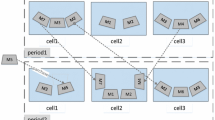Abstract
In this paper, the machine loading problem (MLP) as an example of combinatorial problems is presented within a Flexible Manufacturing Cell (FMC) environment. In general, MLP can be modeled as a general assignment problem and hence formulated as 0-1 mixed integer programming problem which have been effectively solved by a variety of heuristics methodologies. Recently, Neural Networks have been applied to various problems with a view of optimization. Especially, Hopfield Networks to solve MLP having objective of balancing workload of machines is discussed in this paper. While heuristic methods may take a long time to obtain the solutions when the size of problems is increased, Hopfield Networks are able to find the optimal or near-optimal solutions quickly through massive and parallel computation. By such capabilities of Hopfield Networks, it is also possible to approach real-time optimization problems. The focus in this paper is on the quality of solutions of Hopfield Networks by means of comparison with other heuristic methods through simulation, considering machine-breakdown. The simulation results show that the productivity of parts is highly improved and that utilization of each machines is equalized by achieving a balanced workload on machines.
Preview
Unable to display preview. Download preview PDF.
Similar content being viewed by others
References
Kusiak, A.: Flexible Manufacturing Systems: A Structural Approach. International Journal of Production Research 23, 1057–1073 (1985)
Stecke, K.E.: Formulation and Solution of Nonlinear Integer Production Planning Problems for Flexible Manufacturing Systems. Management Science 29, 273–288 (1983)
Kusiak, A.: Loading Models in Flexible Manufacturing Systems. In: Raouf, A., Ben-Daya, M. (eds.) Flexible Manufacturing Systems: Recent Developments, pp. 141–156. Elsevier Science, Amsterdam (1995)
Berrada, M., Stecke, K.E.: A Branch and Bound Approach for Machine Load Balancing in Flexible Manufacturing Systems. Management Science 32, 1316–1335 (1986)
Kim, Y.D., Yano, C.A.: A new branch and bound algorithm for loading problems in flexible manufacturing systems. The International Journal of Flexible Manufacturing Systems 6, 361–382 (1994)
Mukhopadhyay, S.K., Midha, S., Krishna, V.M.: A heuristic procedure for loading problems in flexible manufacturing systems. International Journal of Production Research 30, 2213–2228 (1992)
Kuhn, H.: A Heuristic Algorithm for the Loading Problem in Flexible Manufacturing Systems. The International Journal of Flexible Manufacturing Systems 7, 229–254 (1995)
Vidyarthi, N.K., Tiwari, M.K.: Machine loading problem of FMS: a fuzzy-based heuristic approach. International Journal of Production Research 39, 953–979 (2001)
Mukhopadhyay, S.K., Singh, M.K., Srivastava, R.: FMS machine loading: a simulated annealing approach. International Journal of Production Research 36, 1529–1547 (1998)
Basnet, C.: A Genetic Algorithm for a Loading Problem in Flexible Manufacturing Systems. In: MS/IS Conference in Korea, vol. 4, pp. 284–287 (2001)
Hopfield, J.J., Tank, D.W.: Neural computation of decisions in optimization problems. Biological Cybernetics 52, 141–152 (1985)
Gong, D., Gen, M., Yamazaki, G., Xu, W.: Neural Network approach for general assignment problem. In: Proceedings of the International Conference on Neural Networks, 4th edn., pp. 1861–1866 (1995)
Zhou, D.N., Cherkassky, V., Baldwin, T.R., Hong, D.W.: Scaling neural network for job-shop scheduling. In: Proceedings of the International Conference on Neural Networks, vol. 3, pp. 889–894 (1990)
Wilson, G.V., Pawley, G.S.: On the stability of the traveling salesman problem algorithm of Hopfield and Tank. Biological Cybernetics 58, 63–70 (1988)
Ramanujan, J., Sadayappan, P.: Optimization by neural networks. In: Proceedings of IEEE International Conference on Neural Network, vol. 2, pp. 325–332 (1988)
Kelton, D.W., Sadowski, P.R., Sadowski, A.D.: Simulation with ARENA. McGraw-Hill, Sydney (2002)
Dogramaci, A., Surkis, J.: Evaluation of a heuristic for scheduling independent jobs on parallel identical processors. Management Science 25, 1208–1216 (1979)
Baker, K.R.: Introduction to Sequencing and Scheduling. John Wiley & Sons, Chichester (1974)
Author information
Authors and Affiliations
Editor information
Editors and Affiliations
Rights and permissions
Copyright information
© 2005 Springer-Verlag Berlin Heidelberg
About this paper
Cite this paper
Jang, S.Y., Kim, D., Kerr, R. (2005). A Study on the Machine Loading Problem Considering Machine-Breakdown in Flexible Manufacturing Systems. In: Baik, DK. (eds) Systems Modeling and Simulation: Theory and Applications. AsiaSim 2004. Lecture Notes in Computer Science(), vol 3398. Springer, Berlin, Heidelberg. https://doi.org/10.1007/978-3-540-30585-9_6
Download citation
DOI: https://doi.org/10.1007/978-3-540-30585-9_6
Publisher Name: Springer, Berlin, Heidelberg
Print ISBN: 978-3-540-24477-6
Online ISBN: 978-3-540-30585-9
eBook Packages: Computer ScienceComputer Science (R0)




